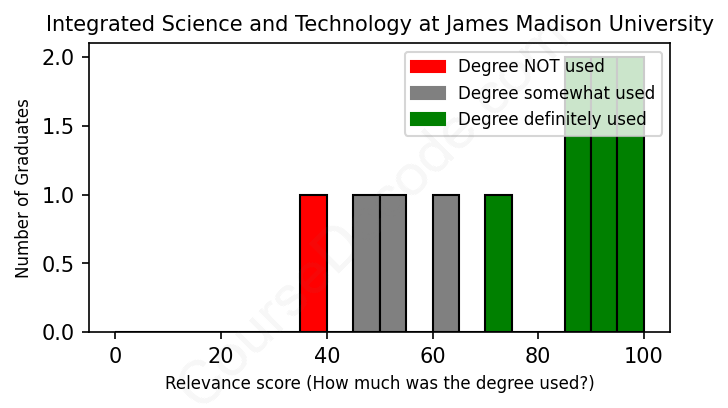
First, some facts. Of the Integrated Science and Technology graduates from James Madison University we've analyzed , here's how many have used (or NOT used) their degree in their career:

These are estimates based on AI analysis of 11 LinkedIn profiles (see below).
The verdict? Above average. Overall, with an average relevance score of 74%, Integrated Science and Technology graduates from James Madison University have a higher likelihood (+7%) of finding work in this field compared to the average graduate across all fields:
And for comparison, here's the chart for all profiles we've looked at across all degrees.
Also, after graduating, only 27% of these graduates have pursued further education other than another Bachelor's degree (such as a Masters degree or other), compared to the average across all profiles of 35%. This suggests a Bachelors degree is enough for most Integrated Science and Technology graduates, and it's normal to look for work straight after graduation.
See the details:
|
Relevance score: 94% We think this person has gone into a career highly relevant to their degree. We think this person has gone into a career highly relevant to their degree.
DEGREE INFOGraduated in 2016 from James Madison University with a Bachelor of Applied Science - BASc in Integrated Science and Technology. No other secondary education since. JOB HISTORY SINCE GRADUATIONAIC Specialist CityWorth Mortgage Oct 2017 - Jun 2018 Software Analyst  AEM Corporation Jan 2019 - Aug 2022 Junior Engineer/Technical Analyst for Software Assurance  AMERICAN SYSTEMS Aug 2022 - Present ABOUTNo information provided. |
The top 10 most common jobs done by the graduates we've analyzed (ranked most common to least) are:
From my analysis of LinkedIn profiles of graduates from James Madison University with a degree in Integrated Science and Technology, it seems like they have split into a few common career paths. Many have ventured into technical fields like RF engineering and material science where they apply principles from their studies directly related to radio frequencies, materials science, and various engineering practices. Roles like RF Engineer, Software Analyst, and Material Process Engineer are highly relevant, showcasing a strong connection to the skills learned in their academic program. These positions typically demand a solid grasp of scientific and technological concepts—which is great for those looking to build a career directly linked to their degree.
On the flip side, some graduates have taken on roles that, while they may use some analytical skills or technical knowledge, are more oriented toward sales, management, or operations and don’t lean heavily on the core content of Integrated Science and Technology. For example, positions like Senior Sales Engineer and various management roles often require more soft skills than technical expertise. Overall, while a good number of these graduates are thriving in positions that closely align with their degree, a significant portion have branched into areas that aren't as directly related, showing that graduates can find success in various fields even if they stray from their primary study focus.
Here is a visual representation of the most common words in job titles for Integrated Science and Technology graduates (this is across all Integrated Science and Technology graduates we've analyzed, not just those who went to James Madison University):

Looking at the career paths of graduates from the Integrated Science and Technology program at James Madison University, it’s clear that many have smoothly transitioned into relevant jobs shortly after graduation. For their first positions, a lot of these graduates started in technical roles or engineering-related areas, such as RF Engineer or Software Analyst. This makes sense because the curriculum likely equips them with both the theoretical knowledge and practical skills needed in fields like technology, engineering, or project management. As they gain experience, we see many of them moving into higher-level positions, such as Senior Engineers or Product Managers, showing a clear trajectory of growth and specialization over the years.
Fast forward five to ten years after they graduated, it’s apparent that these alumni generally find themselves in solid careers tied to their degrees. Many have climbed the ranks in their companies, taking on managerial and leadership roles. For instance, graduates who started as junior engineers or analysts have progressed to positions like Senior Business Analyst or Associate Project Manager. While there are some variations in individual experiences—like someone shifting to a more niche field in orthotics or sustainability—the overall trend is quite positive. Most graduates seem to be thriving in careers that leverage their Integrated Science and Technology education, signaling that the program effectively prepares students for the workforce and long-term professional success.
Honestly, the Bachelor’s degree in Integrated Science and Technology at James Madison University is pretty manageable, especially if you're someone who enjoys hands-on learning and is curious about how different fields connect. It covers a mix of science, technology, and a bit of engineering, so it can be challenging, but it’s not as intense as some other tech-heavy degrees. Most students find that the workload is reasonable, with a good balance of theory and practical projects. If you keep up with the readings and engage with the labs and group work, you should be just fine! Overall, it’s a solid program that’s more about applying what you learn rather than drowning in high-level math or complex theories.
Most commonly, in the LinkedIn profiles we've looked at, it takes people 4 years to finish a Bachelor degree in Integrated Science and Technology.
Looking at these JMU grads, it definitely seems like they’re on a pretty solid financial path! Many of them started with entry-level positions but have progressed quickly into roles with "Senior" or "Manager" titles, which usually come with better paychecks. For instance, the RF Engineer climbing the ranks at Shentel went from entry-level to Senior engineer in just a few years, showing that there are good opportunities for salary growth. Plus, the ones in tech and engineering positions, particularly at companies like Accenture and Newport News Shipbuilding, are likely raking in decent salaries given the demand for those skills. Overall, it looks like most of these grads are doing well for themselves and are on track to make good money!
Here is a visual representation of the most common words seen in the "about" section of LinkedIn profiles who have a Bachelor degree in Integrated Science and Technology (this is across all Integrated Science and Technology graduates we've analyzed, not just those who went to James Madison University). This may or may not be useful:

Here are all colleges offering a Bachelor degree in Integrated Science and Technology (ordered by the average relevance score of their Integrated Science and Technology graduates, best to worst) where we have analyzed at least 10 of their graduates:
| College | Score | Count |
|---|---|---|
 James Madison University James Madison University
|
74 | 11 |